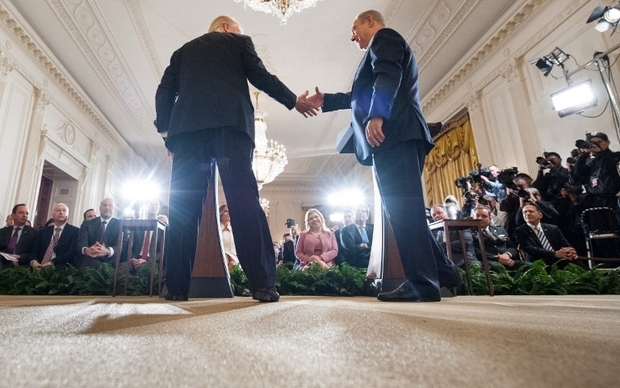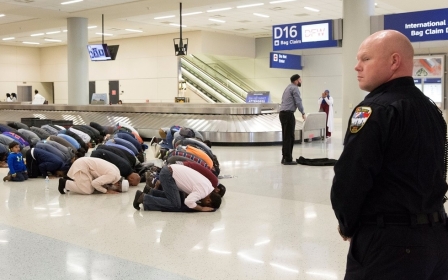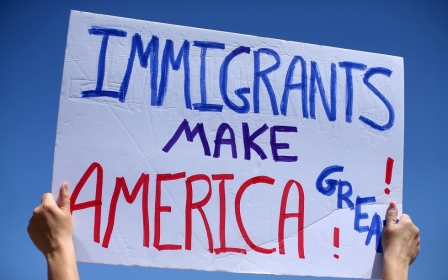Trump's first 100 days: Pro-Israel hawks disappointed by unfulfilled promises
When Donald Trump was a presidential candidate, he repeatedly vowed to move the US embassy in Israel to Jerusalem. But almost 100 days into his presidency, the embassy remains in Tel Aviv.
The walk-back has disappointed pro-Israel hawks. An embassy in Jerusalem would effectively recognise the city as Israel's capital, a move that would spark protests from the Palestinians and Arab states, who consider Jerusalem to be occupied and want the eastern half to be the future capital of a Palestinian state.
Jerusalem is also home to Islam's third-holiest site. Moving the US embassy there would inevitably anger Muslim masses around the world and could lead to increased attacks by militants against American interests.
In another move that negates right-wing priorities, the Trump administration reportedly wants to increase economic aid to the Palestinians at a time when some pro-Israel groups are lobbying for an aid cut-off to the Palestinian Authority.
As a candidate, Trump promised to throw a bomb into the Washington establishment on every issue - Israel included. He hinted he would let Israel build settlements with no American protest.
But so far, in his first 100 days, Trump has focused on peace talks with the Palestinians and held off on moving the embassy. The White House has also asked Israel for restraint on settlement building. It's been enough to anger the hardline American right, who want him to support Israel no matter what - consequences be damned.
"On some things Trump has been completely unusual, for good or for bad, whatever you think of him," Ilan Goldenberg, head of the Middle East program at the Center for a New American Security and a former State Department employee who worked on Israeli-Palestinian peace, told Middle East Eye.
"On Israel/Palestine, he's been nothing but a relatively conventional Republican president: Look to build a relationship with the Israelis, chide them a little on settlements and try to restrain them."
Trump has made a show of strengthening the American-Israeli alliance. He gave a warm welcome to Israeli Prime Minister Benjamin Netanyahu and announced that his administration would not pursue the two-state solution. In the early stages of his administration, Israeli settlement announcements were greeted with silence from the White House, a departure from previous administrations that condemned Israeli settlements as an obstacle to peace.
He has also made appointments that pleased right-wing pro-Israel groups. His ambassador to Israel, David Friedman, raised millions of dollars for the West Bank settlement of Beit El. His ambassador to the United Nations, Nikki Haley, has become a rock star in pro-Israel circles for her repeated denunciations of UN criticism of the state.
"There's been a dramatic change since the last administration, the most hostile administration to Israel ever, to the Trump administration being extraordinarily friendly to Israel," Mort Klein, the president of the right-wing Zionist Organization of America, told Middle East Eye.
But the so-far unfulfilled promise of moving the US embassy to Jerusalem, which to many on the right would prove Trump is the most pro-Israel president in history, has led to some grumbles.
Sheldon Adelson, the billionaire casino magnate and financial backer of pro-Israel causes, has privately complained that Trump has not moved the embassy, according to Politico. Adelson has not donated any money to pro-Trump groups since the inauguration, a cause of concern for Republicans who rely on his largesse to fund their political campaigns.
Klein is likewise miffed about the embassy. "He made a public commitment to move it when he's in office," he said. "It'd be very important for America to say [to the Palestinians]: 'the jig is up, Jerusalem is not holy to you, you only want to take it away from the Jews'."
The head of the Zionist group is also disappointed that Mahmoud Abbas, the president of the Palestinian Authority, is getting a White House welcome on 3 May, when he and Trump will discuss the possibility of peace talks with Netanyahu.
"That to me says [Israel and Palestine] is a presidential priority," said Goldenberg, the former State Department employee. "Trump wants to do the deal."
The proposal for more economic aid to the Palestinians comes as Christians United for Israel, the largest pro-Israel group in the US, is lobbying for a halt in aid to the Palestinian Authority.
'He may have got into office and began finding out this is not that simple and that he should probably avoid sudden moves'
-Yousef Munayyer, of US Campaign for Palestinian Rights
Called the Taylor Force Act - after an American stabbed to death by a Palestinian militant - a proposed piece of legislation would cut off funding to the Palestinian Authority as long as it continues to give out cash to prisoners convicted of militant attacks or their families.
Aid to Palestinians
The Christian group has gotten the support of some key legislators, but has run into some headwinds, not least of which is a Trump administration seemingly not interested in reducing aid to the Palestinian Authority.
In the past, Israeli officials have lobbied Congress to keep funding the Palestinian Authority, since their security forces, in collaboration with Israel, root out militant networks that plan attacks against Israelis.
"It is appalling to give any US taxpayer dollars to a regime that pays people to murder Jews, that names streets after Jew killers," the Zionist Organization of America's Klein said. "Not only should there be no increase, Abbas should be told that if he doesn't change his ways in the next few months, all aid should be cut."
Still, for all their disappointments in the first 100 days, pro-Israel groups may find themselves once again cheering for Trump if the possibility for a peace deal recedes and he decides to fulfill his campaign promises.
"He may have got into office and begun finding out this is not that simple and that he should probably avoid sudden moves that could complicate the longer-term goals. I think that's what we've seen on the embassy so far," Yousef Munayyer, the executive director of the US Campaign for Palestinian Rights, told MEE.
"However, that doesn't mean the embassy won't move, that doesn't mean he may not ultimately make that change."
Munayyer said that, in the end, the settler movement and its allies in the US have little reason to worry about Trump.
"I don't think they're going to be disappointed," he said. "At the end of the day, the settlements are going to continue to expand and US support for Israel will continue to flow."
New MEE newsletter: Jerusalem Dispatch
Sign up to get the latest insights and analysis on Israel-Palestine, alongside Turkey Unpacked and other MEE newsletters
Middle East Eye delivers independent and unrivalled coverage and analysis of the Middle East, North Africa and beyond. To learn more about republishing this content and the associated fees, please fill out this form. More about MEE can be found here.





